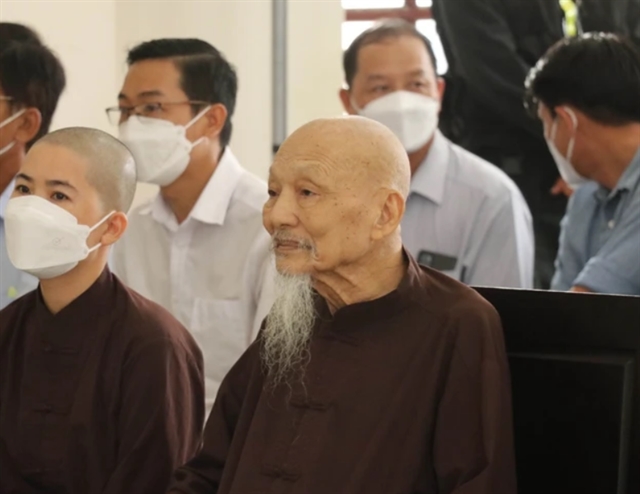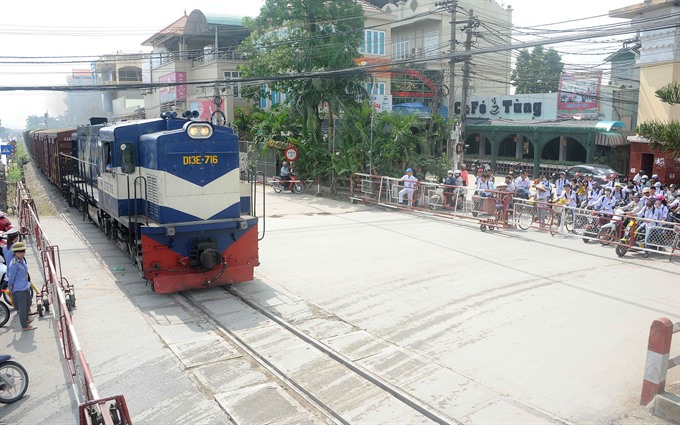 Society
Society

Members of the National Assembly Standing Committee (NASC) yesterday agreed that the revised railway law needs comprehensive regulations that will help revitalise the country’s railway industry.
 |
| A road-railway crossing in Hà Nội’s Thường Tín District. Members of the National Assembly Standing Committee agree that the revised railway law needs comprehensive regulations that will help revitalise the country’s railway industry. – VNA/VNS Photo Quang Quyết |
HÀ NỘI — Members of the National Assembly Standing Committee (NASC) yesterday agreed that the revised railway law needs comprehensive regulations that will help revitalise the country’s railway industry.
Under the draft of the revised law which was on NASC’s agenda yesterday, the Government gives priority to developing, maintaining and protecting national and urban railways in accordance with approved national transport development planning.
The Government calls for and will support organisations and individuals in investing or running railway businesses.
The draft sees a new regulation on Government supports for the study and adoption of advanced science and technology in a modern railway sector.
Phan Xuân Dũng, chairman of the National Assembly Committee for Science, Technology and Environment said that the compilers of the law include the committee and transport ministry – who also proposed a regulation in which the Government spends a proper proportion of the mid-term and yearly State-budget on railways.
Modest investment has been blamed on the slow development or even lagging behind of the railway sector in Việt Nam.
Since the draft for the revised Railway Law was on the NA’s agenda last November, the compilers made changes following the opinions of deputies. For example, the updated draft includes regulations on the construction of railway stations and service areas. The updated draft removed the regulation in which enterprises are not allowed to provide services on State-owned railway routes which the Government had assigned them to operate.
Instead, railway businesses are regulated as conditional businesses and the Government would issue a list of requirements.
NA vice chairman Phùng Quốc Hiển stated that in 2015, funding for railways accounted for 1.6 per cent of the State’s transport fund while roads received over 92 per cent, inland waterways 1.9 per cent, marine transport 3.3 per cent and airlines 0.3 per cent.
He said that Việt Nam concentrated too much on roads and called for a balance in investment across different transport modes as well as better links among the four modes.
Transport Minister Trương Quang Nghĩa said that railways in Việt Nam had the advantage that they could stretch from north to south.
“Once rail becomes the top option for carrying passengers and goods, transport costs will drop,” he said.
Head of NA’s Justice Committee Lê Thị Nga said that roads and coach services had improved over the last few years, becoming very attractive to passengers while railway services were struggling. To boost the railway sector detailed policies are needed.
Tackling NGO violations
Also yesterday, NASC members looked into the amount of fines imposed on violations by non-governmental organisations (NGO) that had been proposed earlier by the Government.
Speaking at the session on behalf of the Government, Deputy Minister of Foreign Affairs Bùi Thanh Sơn said operations by Việt Nam-based NGOs generally abide by the country’s laws. However, violations still persist, including operating without registration licences, renting offices without permission, or office addresses that are different from those stated in registration licences.
Sơn added that there were also organisations engaged in activities that go against social ethics and the country’s interests.
“There are also those trying to meddle in the country’s domestic affairs with activities such as attempting to influence structural reforms and changes to the law, or releasing announcements that slanders Việt Nam adherence to human rights and religious freedom,” Sơn said.
As for the organisation of international seminars or conferences, common violations include organising without obtaining permission or having permission but failing to consult with the Ministry of Foreign Affairs or related localities and agencies; and not reporting the results of seminars and conferences to competent authorities as required.
To ensure the strict adherence to the law and increase the awareness of NGOs in Việt Nam, the Government proposed to the NA a maximum fine of VNĐ30 million (US$1,300) for violations in NGOs’ operations.
Meanwhile, a maximum fine of VNĐ20 million is proposed for violations in the organisation of international seminars and conferences.
Head of the NA’s Legal Committee Nguyễn Khắc Định said the majority of the committee’s members agreed with the amount the Government had proposed to tackle violations in the operations of NGOs, despite the fact that they were rare.
They said that the Ministry of Foreign Affairs could also impose other kinds of punishments, aside from penalties, such as revoking registration licences, or expelling responsible persons from the country in case of severe violations.
They also concurred with the proposed VNĐ20-million-fine on violations in holding international seminars and conferences.
However they said it is necessary to clarify that this is the maximum amount that can be imposed on individuals. In case of violations by organisations, the amount should be doubled.
At the end of the session, NASC voted to agree on the amounts that the Government had proposed. — VNS









